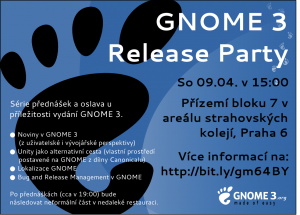This year, the GNOME Czech Translation Team officially participates in the Google Code-in program for pre-university students ages 13-18. I joined the GNOME mentors group and submitted four tasks so that students can help our team with updating GNOME 3.4 translations for gnome-system-monitor and seahorse’s UI, and brasero and file-roller’s documentation.
The full announcement in Czech was posted to the Czech translation team mailing list.
Great news is that one of the tasks has been already claimed by a student. But if you know anybody interested and suitable to participate in the program, or if you’re a Czech-speaking student yourself, don’t hesitate and claim your task today! Just keep in mind that all works stop on January 16, 2012.
From looking at the list of tasks submitted for the GNOME Project, it’s very pleasing to see that there are several GNOME translation teams also taking part in the program, besides other, perhaps more usual tasks oriented on coding, documentation, etc.
Big thanks goes to our Czech teammate André Klapper for providing me with some useful information and, above all, for coordinating the whole effort from the GNOME end.
And, obviously, big thanks to Google for organizing this program.


